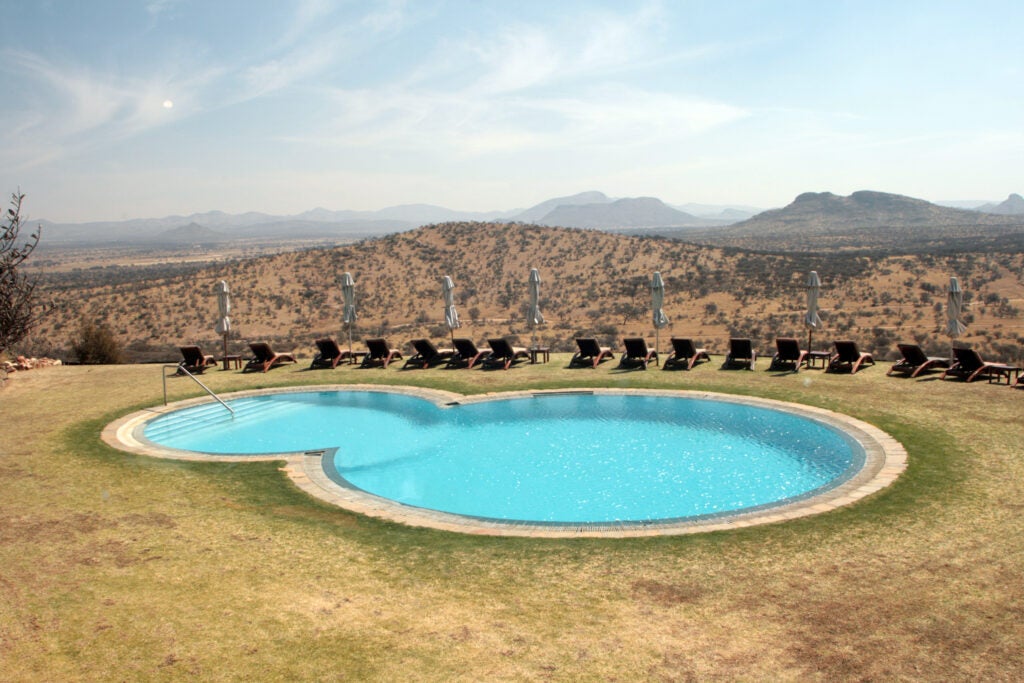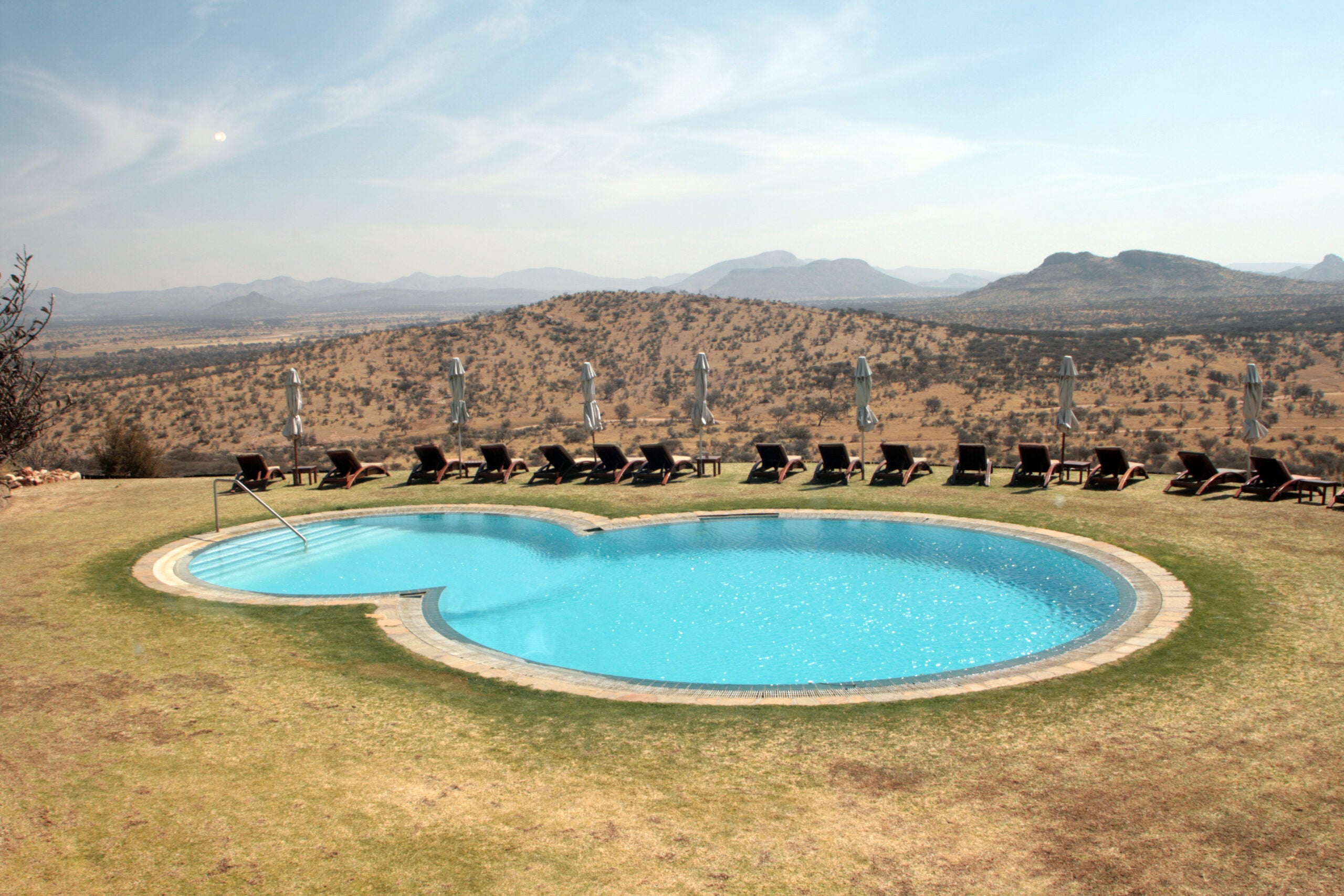Eco-Tourism is an Eco-Drain
By Erin Czelusniak, CAS ’24

Image of a pool in the countryside of Namibia. Photo provided by Simone Durante_Adobe Stock.
If you want to experience the majestic wild savannah of Africa with all the amenities of a luxury vacation, options are in no short supply. Indeed, they are only growing. Amid the intensity of today’s modern society, visiting the last “untouched” corners of the earth attracts tourists in staggering numbers.
However, these areas aren’t always the paradises they promote themselves to be.
Across South Africa, ecotourism subjects the land and surrounding communities to heavy exploitation of resources, especially water. Disappointingly, this is quite a deterrence from the “responsible travel to natural areas that conserves the environment, sustains the well-being of the local people, and involves interpretation and education” that the ecotourism industry claims to represent.
The establishment of “protected areas” in the late 1800s was one of the first iterations of ecotourism. The International Union for the Conservation of Nature (IUCN) defines a protected area as “an area of land and/or sea especially dedicated to the protection and maintenance of biological diversity, and of natural and associated cultural resources, and managed through legal or other effective means.”
Though an inspiring concept, the establishment of these areas is often to the detriment of local inhabitants. National parks in Southern Africa, for example, that were originally established as game reserves during the colonial era, evicted the people who had been historically dependent on that land and its natural resources. Those who stayed near the newly protected areas were further subjected to game and gun laws, in addition to license quotas, effectively cutting off vital food sources.
Today, protected areas are increasingly managed for the benefit of the private sector, national governments and tourists, rather than local communities. Governments and the private sector rake in as much as 25% of the national GDP in certain developing nations. In turn, local communities have become increasingly impoverished and resentful.
Although ecotourism was born out of the desire to protect certain areas from exploitation, it often fails to uphold the original standards, leading to deforestation, the disruption of ecological life, pollution and environmental degradation.
Although ecotourism was born out of the desire to protect certain areas from exploitation, it often fails to uphold the original standards, leading to deforestation, the disruption of ecological life, pollution and environmental degradation. Such effects put surrounding communities at a further disadvantage.
Water use for ecotourism is arguably the most contradictory to the original goals of protected areas. Given that 85% of international tourists travel to destinations with water scarcity, this is an especially prevalent and pressing issue. Ecotourism destinations often exceed basic water needs like washing, toilets, food and fuel production by offering water-intense luxuries such as spas, swimming pools and extravagant landscapes.
Though dependent on the location, on average, tourists traveling to these locations consume more water per capita than the local residents. While the average European consumes between 120 and 150 liters of water per day domestically, this number increases drastically when traveling. The average guest consumption across destinations in South Africa, Botswana, and Namibia jumps to a staggering 2,073 liters per guest per night.
In comparison, local communities have been recorded using only 88-371 liters per person per day. For water-scarce areas in particular, this irresponsible water use by the ecotourism sector has adverse effects on the natural supply of the area. Environmental impacts can vary greatly depending on the habits of the ecotourism destination, the resilience of the ecosystem and the specific vegetation, climate and edaphic factors.
The effects of limited water reverberate through the food web: less vegetation means less food and fewer places for prey to hide. Under these stressful conditions, animals are forced to search for these vital resources outside of their designated protected area, often entering into human communities. While this may provide temporary relief, fatal outcomes are possible as civilians try to protect their own scarce resources. This pillaging has a particularly adverse effect on the poor amid water shortages and reduced harvests.
In addition to direct harm, contact with other species outside of their protected areas increases the spread of infectious diseases among wildlife populations. One such example can be seen in Kenya’s Lake Nakuru National Park where the mass death of flamingos has been a recurring concern. The spread of infectious diseases also threatens livestock populations, further hurting vulnerable communities.
While ecotourism can positively contribute to reducing poverty, increasing income, improving living standards, raising education quality and strengthening political stability, irresponsible water use often perpetuates harm to the poor.
Resource scarcity is often a positive feedback loop for those with the least options at their disposal. Desperate community members continue to extract from the natural resources on which they depend, even as the resource dwindles, having no other option to meet their basic needs.
Locals’ health also suffers during periods of drought as the depletion of surface water forces animals to forage near rivers, impacting the water quality as it flows downstream to the villages for human consumption.
A questionnaire survey conducted in rural communities near Umfolozi, Hluhluwe and the local conservation area of the Corridor Complex Game Reserve in South Africa revealed that only 65% of the respondents had a positive outlook on conservation in general, and even fewer had a positive view of their local reserve and its management. The prevalence of positive responses rose with both increasing household affluence and level of education, presumably due to a decrease in vulnerability since poorer communities often experience negative environmental impacts at disproportionately high rates. Positive responses also increased if the respondent had received some kind of benefit from the conservation area, which led the researchers to encourage the integration of conservation areas into local economies. This unwillingness to contribute to the local economy within the ecotourism sector significantly complicates the process of poverty alleviation, confining communities to the fatal cycle of inequality and environmental degradation.
Given that water is the foundational resource of life, its mismanagement by the ecotourism sector thus far has created detrimental impacts on the surrounding environments and communities. Thankfully, it is not too late to reverse these practices.
With the reduction of water consumption and the inclusion of local communities in its management, ecotourism presents an opportunity for an acceleration in poverty reduction that is imperative to breaking the deadly link between inequality and the environment.
In the future, governments and consumers must demand accountability from the ecotourism industry to ensure sustainable and ethical business practices. This way, the escape to nature that so many crave will serve as a humbling reminder of resource exploitation as opposed to simply just another commodified good.

